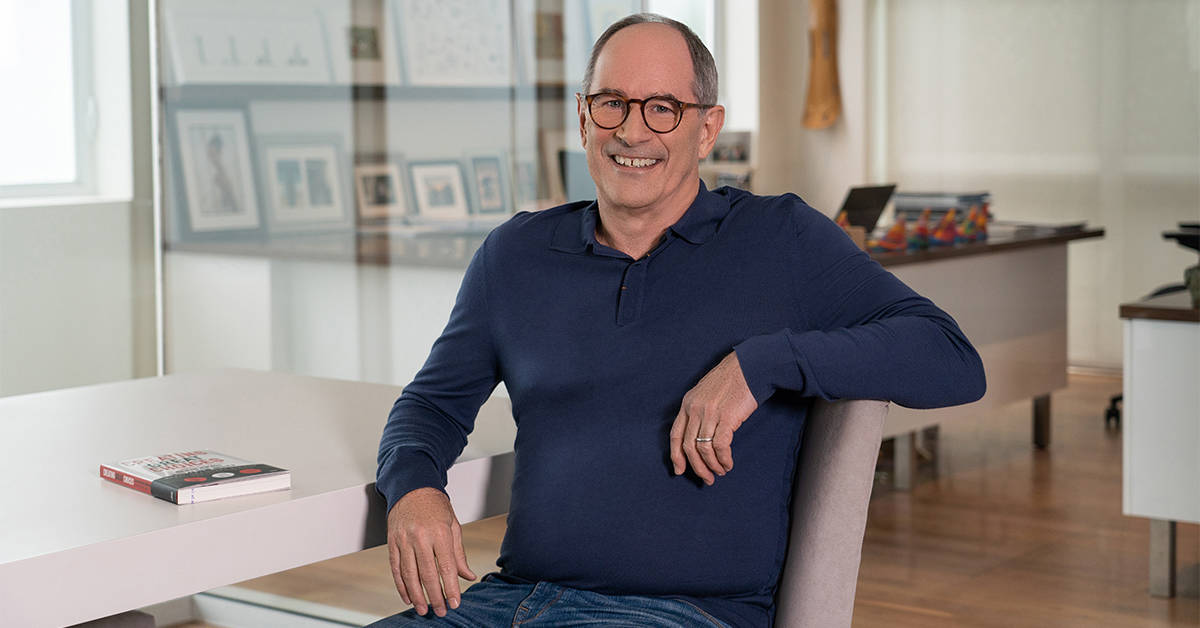Roger L. Martin, named the world’s number-one thinker in business management in 2017, and appointed to the Order of Canada the year before, describes growing up in Wallenstein.
“There were eight houses. Four on each side, because one house was attached to the general store, which was across the street. And then there was a blacksmith shop kitty-corner across from them, down the side road with a harness shop. And that was it,” he said.
Since his childhood in Wallenstein, Martin has gone on to become a world-renowned thought leader in business management. He advises the CEO’s of high-profile businesses such as Lego, Procter & Gamble, and Ford. He’s also the former dean of the Rotman School of Management at the University of Toronto. Yet, the signature blend of compassion and practicality that comes from growing up in a small village outside Elmira shines through in his comfortable way of speaking, and his straightforward approach to business and the economy.
“I’ve always thought that there is an advantage of being from a place as small as (Wallenstein). Which is that, even as a young person you feel you kind of understand your context. Because it’s so simple, right?” he said.
“So I think that helped me to go out into the world and say, ‘you know, I can figure this out.’ And so I can figure out why the dominant management theories, these 14 of them, are deeply flawed, and here would be a better one. And I might be wrong, but I don’t say, ‘that would be an impossible task.’ So I think that had an impact.”
Martin’s latest book is entitled, “A New Way to Think: Your Guide to Superior Management Effectiveness.” It was named one of ten must-read career and leadership books for 2022 by Forbes magazine.
The book is designed to be read as a guide book with a fresh approach on how to tackle the common problems faced by every executive. Though it’s written for executives, readers don’t need to be running multinational corporations to find value in it.
“What I hope (readers) grasp is maybe two things,” he said. “One, which is, lots of the models that people say are the way you should think about a problem aren’t particularly great ways to think about all problems.”
The second takeaway is helping readers to consume models for problem-solving more thoughtfully and consciously. He believes the practice of doubling down on a model that doesn’t work is too common.
“You own (models), they don’t own you,” he said. “A model owns you if you use it for a given purpose. It failed to accomplish the purpose. You use it again. It fails again. You keep using it saying, ‘if I only use it properly, it’ll work.’ Then it somehow has ownership, cognitive ownership, of you.
“If instead you use a model with a particular intended outcome that doesn’t produce the intended outcome. You maybe do it again, saying ‘well, maybe it is partially my fault, I’ll give it another chance.’ But when you’ve given it another chance, and it still fails, you should rapidly be saying, ‘the model probably is a bad model, and I should think about a better model.’
“I want (readers) to be thinking about owning their models and to be, one: skeptical of models that you’re given. And two: own your models.”
The majority of Martin’s writing is directed at corporate executives, whose compensation is usually tied to the performance of their companies on the stock market. Martin advocates for the success of companies to be tied to their actual performance, rather than the perception of their future worth on the exchange. He argues CEO compensation should be tied to the real market, not the expectations of the stock market, and until this is done, the market will continue to be driven from crisis to crisis.
“The modern capital markets have ceased to be vehicles for financing the companies of the world, or of America in this case. They are speculative casinos, where people are speculating over the value of shares.
“What’s this company worth? It’s trading at 25, I think it’s gonna go up to 30. I’m going to buy it at 25, and I’m going to look to make money. And the person selling it says ‘I don’t think it’s worth any more than 25 I’ll give it to them.’ That’s what it (the stock market) does now. So people defend the capital markets as this engine of growth, and I say it has ceased to be significantly that.”
But will society see the day when the worth of companies is determined by their performance rather than perceived future worth? Martin is optimistic, and believes the system will right itself in the long run as over time more and more people realize that the current system just isn’t working.
“I’ve become, in my old age, more patient,” he said. “These things have long cycles. And I use my job, in part, as pointing out these anomalies, explaining why they are anomalous, pointing to a better direction, and then have to wait until enough of these anomalies cause people to say, ‘just maybe, this isn’t working.’”
The stock market just closed out its worst first half since the 1970s, according to Forbes. In Woolwich and Wellesley townships, many people are trying to survive today’s difficult economic climate: high inflation with no clear path for how to keep up with it, unaffordable housing and high cost for fuel and food.
Martin’s practical advice for people during these tumultuous times is to keep debt down as much as possible, and as best as can be managed, tie any debt to assets that are most likely to appreciate. “This is not the time to go and buy an expensive car,” he said.
He also believes it won’t last forever.
“My dad always used to talk about, or still does, I mean, he was born in 1929. And so those first 10, 12 years of his life were the Great Depression. And it probably felt like that was forever. But it wasn’t. GDP per capita, in 1941, was higher than it was in 1929. And then there was a huge period of growth thereafter,” he said.
“Was it unpleasant? Yes, it was. There was starvation in North America and all sorts of malnutrition… so it’s bad, bad, bad. But this too shall pass.
“I would say, think about and plan for the longer term and don’t get too freaked out by the shorter term. And again, if you don’t have a disproportionate amount of debt, you’ll get through it to the other side.”









